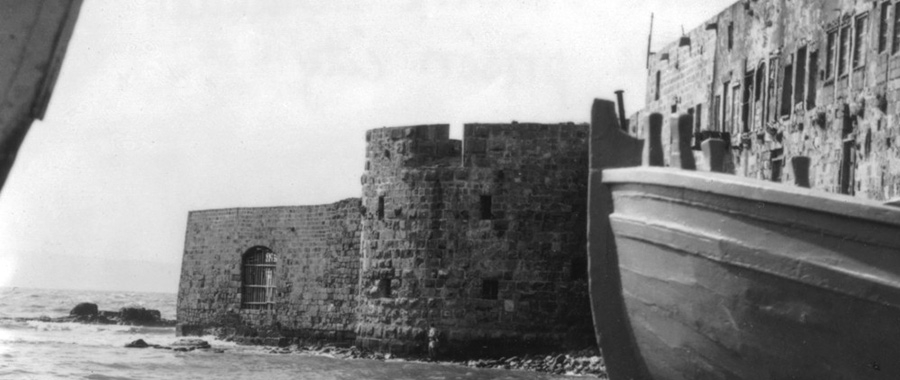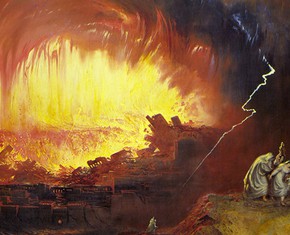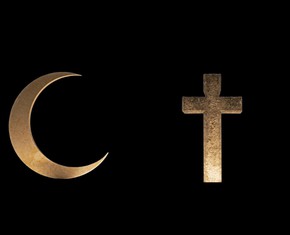The views expressed in our content reflect individual perspectives and do not represent the authoritative views of the Baha'i Faith.
“Open the doors of your hearts. He Who is the Spirit verily standeth before them.” Doesn’t this sound like Jesus, knocking at the door of your heart?
But these words come from Baha’u’llah who, Baha’is believe, was foretold by Jesus.
You may have heard of Baha’u’llah’s Most Holy Book (or, in Arabic, the Kitab-i-Aqdas), which, as the title clearly suggests, is the most important of all Baha’i scriptures. But did you know that there is a “Most Holy Tablet” (Lawḥ-i-Aqdas) as well? This signal work is also known among Baha’is in the West as Baha’u’llah’s “Tablet to the Christians.” That’s where the passage above comes from.
There is strong evidence that Baha’u’llah revealed the Most Holy Tablet for the Syrian Christian physician Faris Effendi, who, as you’ll recall, was the first Christian Baha’i, having declared his belief in Baha’u’llah in August, 1868, while in prison in Alexandria. Faris had been taught the Baha’i Faith by his fellow prisoner, Nabil-i Aʿẓam, one of the nineteen Apostles of Baha’u’llah and an eminent Baha’i historian. But evidence that the Most Holy Tablet was revealed for Faris, while compelling, is not conclusive. Nevertheless, Baha’i scholar Stephen Lambden has made a strong case that Baha’u’llah did, in fact, reveal the Most Holy Tablet for Faris the physician.
The Most Holy Tablet opens as follows:
This is the Most Holy Tablet sent down from the holy kingdom unto the one who hath set his face towards the Object of the adoration of the world, He Who hath come from the heaven of eternity, invested with transcendent glory.
In the name of the Lord, the Lord of great glory.
This is an Epistle from Our presence unto him whom the veils of names have failed to keep back from God, the Creator of earth and heaven, that his eyes may be cheered in the days of his Lord, the Help in Peril, the Self-Subsisting. – Baha’u’llah, Tablets of Baha’u’llah, p. 9.
The opening sentence refers to a particular person, who, although known, is unnamed. The recipient was a obviously a Christian.
Baha’u’llah then addresses the Christians collectively: “Say, O followers of the Son!” He admonishes them for having “turned aside from Him [Baha’u’llah] and remained sunk in heedlessness.” – Ibid.
It is hard to determine whether this statement is rhetorical and hyperbolic or literal. It was literally true, at that particular time, that only a handful of Christians at most—and possibly Faris the physician alone —had recognized Baha’u’llah as the one whom Christ had foretold.
In his tablet to the Christians, Baha’u’llah specifically refers to the Book of Isaiah along with prophecies of other scriptures. Baha’u’llah then singles out religious leaders as primarily responsible for maintaining the status quo among their followers, which would insulate them from learning about, much less accepting, any claims to a new revelation such as Baha’u’llah had put forth.
Baha’u’llah invokes times past in order to establish historical precedent and patterns of prophetic advent and then popular rejection as being reenacted in the historical present. As then, so now. Baha’u’llah admonishes the Christians:
They read the Evangel and yet refuse to acknowledge the All-Glorious Lord, notwithstanding that He hath come through the potency of His exalted, His mighty and gracious dominion. We, verily, have come for your sakes, and have borne the misfortunes of the world for your salvation. Flee ye the One Who hath sacrificed His life that ye may be quickened? Fear God, O followers of the Spirit, and walk not in the footsteps of every divine that hath gone far astray. – Ibid., p. 10.
Baha’u’llah indicates that Jesus, Sinai, and the “Burning Bush” proclaimed their recognition of Baha’u’llah’s advent:
He Who is the Desired One is come in His transcendent majesty.’ Say, Lo! The Father is come, and that which ye were promised in the Kingdom is fulfilled! This is the Word which the Son concealed, when to those around Him He said: ’Ye cannot bear it now.’ And when the appointed time was fulfilled and the Hour had struck, the Word shone forth above the horizon of the Will of God. – Ibid., p. 11.
Significantly, Baha’u’llah says of Jesus: “Say, verily, He hath testified of Me, and I do testify of Him. Indeed, He hath purposed no one other than Me.” – Ibid. This is a momentous claim, indeed. It flies in the face of prevailing Christian expectations of the cataclysmic and apocalyptic events they unambiguously expected to herald the advent of Christ’s return.
The salvation Baha’u’llah offers is not the same as a traditional Christian one. Baha’u’llah proclaims: “My body hath endured imprisonment that ye may be released from the bondage of self.” – Ibid., p. 12. Notably, this has nothing whatsoever to do with the doctrine of original sin—but it has everything to do with transcending the lower self.
Note that Baha’u’llah’s doctrine of salvation is totally silent as to the notion of being born in sin.
Baha’u’llah’s straightforward idea of salvation disenchants the idea that God’s wrath must somehow be assuaged—especially by the ultimate “blood sacrifice” of Jesus Christ on the cross, in which Jesus suffered in our stead. There is no such elaborate doctrine of salvation here.
Baha’u’llah then compares the Bab with John the Baptist, as having parallel historical roles: “Say, did ye not hearken to the Voice of the Crier, calling aloud in the wilderness of the Bayán [i.e. the Bab’s revelation], bearing unto you the glad-tidings of the coming of your Lord, the All-Merciful?” – Ibid., p. 12. Just as John the Baptist foretold the coming of Jesus Christ, so did the Bab herald Baha’u’llah’s imminent advent. Baha’u’llah then calls upon Faris the physician—and indeed all Christians—to announce Baha’u’llah’s advent:
Proclaim then unto all mankind the glad-tidings of this mighty, this glorious Revelation. Verily, He Who is the Spirit of Truth is come to guide you unto all truth. He speaketh not as prompted by His own self, but as bidden by Him Who is the All-Knowing, the All-Wise.
Say, this is the One Who hath glorified the Son and hath exalted His Cause. Cast away, O peoples of the earth, that which ye have and take fast hold of that which ye are bidden by the All-Powerful, He Who is the Bearer of the Trust of God. – Ibid.
The Most Holy Tablet—the Tablet to the Christians—closes with a number of beatitudes, the last of which is the following:
Blessed is the man who hath detached himself from all else but Me, hath soared in the atmosphere of My love, hath gained admittance into My Kingdom, gazed upon My realms of glory, quaffed the living waters of My bounty, hath drunk his fill from the heavenly river of My loving providence, acquainted himself with My Cause, apprehended that which I concealed within the treasury of My Words, and hath shone forth from the horizon of divine knowledge engaged in My praise and glorification. – Ibid., p. 17.
Faris the physician is the spiritual forebear of Baha’is of Christian heritage (myself included). Evidence strongly suggests that Baha’u’llah revealed the Most Holy Tablet for Faris. Either way, Faris was the first to respond to, and then fulfill, Baha’u’llah’s “Great Commission” (parallel to Jesus’ “Great Commission” in Matthew 28:18-20).
Special thanks to Joshua Hall, whose provisional translation of Baha’u’llah’s Tablet to Raḍ’ar-Ruḥ—along with his technical advice on related Arabic texts—is greatly appreciated. Thanks also to Omid Ghaemmaghami for providing key citations. I am indebted to Stephen Lambden’s published work as well.
You May Also Like
Comments

















I think the first main Christian converts were probably Arab Christians who then taught in the West..
Beautiful article
- Bahá'u'lláh, Cleanings, Selection 36 XXXVI
and lol like everything else Baha'u'llah wrote, I think He wrote it to me, that's how it reads, any ways. :) and that too astonishes me, how "could" He have written to me hundreds of years before I was born...? don't take that too literally, the writings ...make me crazy :)